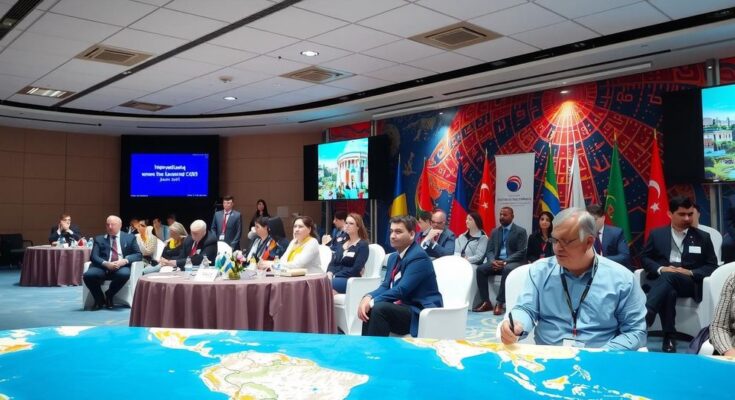The COP29 summit in Baku presented a platform for global leaders to discuss climate change challenges. Key issues included the need for increased climate finance, the role of the construction sector in emissions, youth empowerment, and the importance of energy efficiency alongside renewable energy. While discussions offered hope, the gap between commitments and action raised concerns among developing nations. Overall, COP29 highlighted the urgency for tangible measures to address climate crises effectively.
The Conference of the Parties (COP29), held from November 11 to 22, 2024, at Baku Stadium in Azerbaijan, drew a diverse assembly of global leaders, activists, and innovators to address the pressing issue of climate change. Over the course of the summit, nearly 200 nations convened, highlighting the complexity of perspectives related to climate adaptation and mitigation. While hopeful discussions surrounding innovative technologies and collaborative initiatives brought some optimism, delegates, particularly from developing nations, voiced concerns over the inadequacy of financial commitments made for climate action.
Key topics such as the role of the construction sector in carbon emissions, with a focus on sustainable building technologies, were explored. On this front, experts discussed how embracing sustainable practices could redefine urban development and lead to significant emission reductions. Dr. Andrew Forrest’s call to action, “Build Baby Build,” encapsulated the vision of using renewable energy to foster job creation and drive a green transition.
The urgency of addressing climate change was prominently echoed throughout the event, with an emphasis on data accountability and transparency. Most discussions reinforced the necessity for youth empowerment, recognizing the vital role of younger generations in leading sustainable initiatives within their communities. Furthermore, the need for a balanced approach to energy efficiency and renewable energy was underscored as crucial to achieving impactful climate strategies.
Additionally, the summit provided a platform for vulnerable communities, such as representatives from small island states, to share their existential threats posed by rising sea levels. This critical dialogue emphasized the necessity for equitable financial assistance and highlighted the sentiment that “those who broke it, must pay to fix it” regarding climate damage.
In conclusion, while COP29 fostered hope and commitment to address climate challenges, numerous attending parties reiterated that mere words are insufficient to achieve real progress. Continuous and concrete action, particularly from developed nations, is imperative to meet ambitious climate goals, as emphasized by COP29 President Mukhtar Babayev and outgoing President Sultan Al Jaber. Only through decisive measures can the growing climate crisis be effectively tackled for future generations.
COP29 marks a pivotal moment in the ongoing global conversation surrounding climate change and emphasizes the urgent need for effective strategies to combat its effects. Hosted by Azerbaijan, the summit brought together nearly 200 nations, including advocates from various sectors to address long-standing issues of climate finance, sustainable development, and technological innovation. The assembly is particularly significant given its focus on empowering young leaders and marginalized voices as essential components in the fight against climate change. Gathering diverse perspectives, COP29 highlights the shared challenges faced by developed and developing nations in achieving climate parity and justice in financial commitments.
The dialogues from COP29 underscore an ongoing struggle between ambition and action in the realm of climate change initiatives. With voices from marginalized groups and a strong emphasis on community-led solutions, the summit serves as a critical reminder of the need for accountability and tangible actions to support those most affected by climate crises. As global leaders reaffirm their commitments, the pressure mounts for effective policies to ensure that they translate into reality rather than remaining unfulfilled promises.
Original Source: www.stirworld.com




